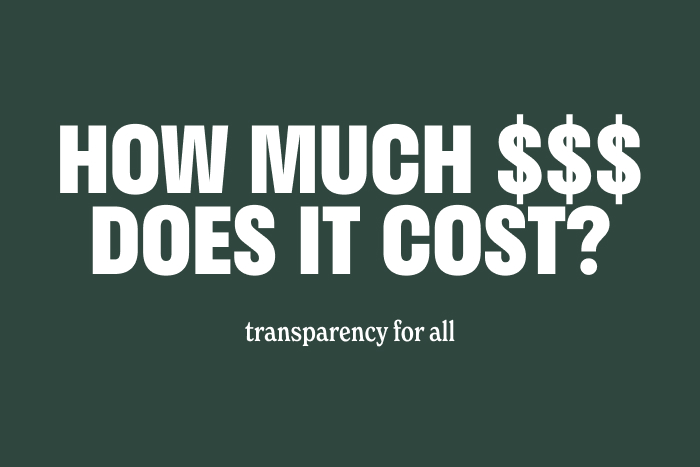Custom vs. Template Church Websites

Should your church use a template website builder or invest in a custom-designed site? We break down the pros, cons, and costs of each option so you can make the right choice for your church.
In this guide, we’ll break down the pros and cons of the two main options for churches: template-based web builders and custom made websites.
Template-Based Church Websites:
Template-based website builders like SnapPages, TheChurchCo, SquareSpace, and many others offer a quick and affordable way to create a website for your church. These platforms provide a few pre-designed templates that can be customized with your church's branding and content.
This option is great for churches who are willing to play inside the boundaries of what these platforms have to offer. But any church that is looking to go beyond their restrictions will be quickly frustrated.
The pros of using a template-based solution include:
- Cost-effective: Template websites are less expensive than custom-built sites, making them a budget-friendly option for smaller churches, those with limited resources, or any church that wants a simple website.
- Easy to set up: With drag-and-drop interfaces and user-friendly editors, template-based builders allow users to create and manage their church's website without technical knowledge. They are also make it fairly quick to create a new website as well.
- Regular updates: Since templated, website builders don't require a lot of technical knowledge. It's easy to make a lot of updates all your own, without needing a web designer or developer.
However, template-based solutions also come with some limitations:
- Limited customization: While templates offer some level of customization, they often restrict your ability to create a truly unique and distinctive website that fully aligns with your church's branding and vision. It won’t take long before you start feeling the frustration of trying to make these platforms accomplish anything outside the templates.
- Lack of advanced features: Template websites may not provide the advanced functionality required by larger churches with complex needs. Instead, you're stuck with what functionality the platform can provide for you. This includes limited content management systems, little custom code implementation, and limited flexibility on responsive design. This also means not having the ability to create custom features such as interactive maps, resource libraries, or custom integrations.
- Bland design: You’ll be stuck with whatever template options the platform provides for your church. First this leads to a bland website that looks just like any other church website. Secondly, and more importantly, you won’t be able to implement a design that feels like your church. Your website should be an extension of your church’s values, personality, and culture. And most templates won’t give you that.
Custom Church Websites: Tailored Solutions for Unique Needs
For medium to large churches with more complex requirements, a custom church website can offer numerous advantages. Custom websites are built from the ground up, allowing for complete control over design, functionality, and user experience.
Although there are some things to know when choosing this option. They come at a higher cost and a steeper learning curve, but it just might be worth it for your church.
The pros of a custom website solution include:
- Unique branding and design: A custom website can be designed to perfectly match your church's visual identity, messaging, and personality, creating a seamless and cohesive online experience for visitors. With this ability, your church website will become an extension of what people will experience on Sundays.
- Advanced functionality: Custom development allows for the integration of advanced features and functionalities tailored to your church's specific needs. And with tools like Webflow, you can accomplish just about anything you can dream of.
- Scalability and flexibility: As your church grows and evolves, a custom website can be easily expanded and modified to accommodate new requirements, ensuring that it remains a powerful tool for outreach and engagement. You can also create custom looks for special pages for Easter, or specific ministries.
- Increased visitor engagement: With a custom website, you have the ability to create a truly compelling and engaging online experience that resonates with your target audience, that will lead to increased visitor retention and growth.
Things to be aware before having a custom website:
- Larger upfront cost: A custom website typically requires hiring a web agency to create the new website. And this isn’t necessarily cheap. If your church has a limited budget, it might not be a good option for you. But for other churches, the higher cost is worth the return — a powerful website that brings more visitors to church on Sundays.
- Steeper learning curve: A custom website is more advanced in nature, which means there are certain things that require a trained professional to manage. This might be a big shift if you're coming from a templated-based web builder. Thankfully, tools like Webflow have helped bridge that gap with their CMS and editor tools. Which allows users of all kinds to manage their custom website all of their own.
- Slower turnaround: Creating a custom website requires a lot more work and time to accomplish. A project like this will likely require at least three months to accomplish.
Choosing the Right Solution for Your Church
Ultimately, the decision between a custom church website and a template-based solution depends on your church's specific needs, resources, and goals. For smaller churches with more basic requirements, a template website may be a cost-effective and easy-to-manage option.
While custom websites require a larger upfront investment, they offer a long-term solution that can fully unlock your church's ability to use its website as a powerful tool for outreach and connection.
Want to learn how to fix your church website today? We’ve got a free resource for you. Learn more here.
Are you ready?

























